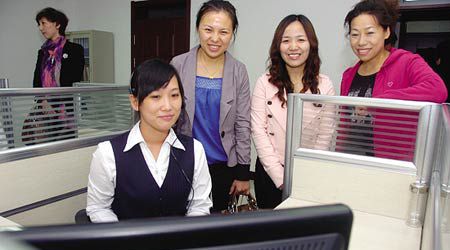服务业工作遭毕业生冷遇
|
爱思英语编者按:尽管今年的就业形势不容乐观,但急缺人才的服务行业仍然无人问津。作为中国三大产业之一,服务业工作为何遇冷?下面来看看一些业内人士的分析吧!
Wang Wenlu is a Tianjin-based HR manager with an international hotel management group. When her company offered a dozen vacancies for clerks, administration assistants, receptionists, and head waiters or waitresses, it hardly received any applications from graduates, who are reportedly trapped in “the toughest year to find a job”. “In terms of the working environment and benefits, our offers are above average,” says Wang. “But students don’t seem to be interested in these jobs.” Several HR managers in the service-oriented sector echo Wang’s notion. “The majority of students have big expectations after graduating,” says Wang Jingshu, a Beijing-based HR manager at a data consulting company that requires every new employee to deal with customer enquiries for the first year. “Graduates often refuse to start their career in a service position.” At the China (Beijing) International Fair for Trade in Services in Beijing at the end of last month, Li Keqiang, China’s premier, pointed out that China’s service sector is a weak point in the country’s economy, accounting for 44.6 percent of China’s GDP in 2012 and 36 percent of jobs. “China’s service sector is trailing developed economies by 10 percent on average,” Li said. He pledged that the government would boost the service sector in the next few years. That said, employers say they are cautious about hiring college graduates who often seem ideal for the job, but are reluctant to do the groundwork. “Though easily dismissed as a simple job, working in the service sector can equip you with solid skills that you cannot learn in the classroom and can transfer to many other aspects of life,” says Ding Yaqi, a Shenzhen-based manager with Bank of China. Ding says working in this industry involves constant interaction with people. “Effective communication, which many college students lack, is the key,” says Ding. “Some customers can be tough to get along with, so you need to be able to figure out exactly what their specific needs are and adjust yourself accordingly to make the experience more rewarding,” says Cao Jianhe, a ticketing manager based in Beijing. Dealing with unpleasant situations is another inevitable part of working in the service sector, whether it’s with your boss, a co-worker or a particularly fussy customer. It’s important to take negativity in your stride and always respond gracefully. “I think patience is the most important,” says Zhong Jianhong, HR Director of Park ’N’ Shop Ltd in Guangzhou. “You need to serve people all day long and work during holidays. So you really need to have a desire to help customers with their individual needs. When you work in a supermarket, you need to memorize all the products,” says Zhong. “Smiling a lot is a great first step.” Besides acquiring skill and patience, graduates experience many different situations. While the job itself may be similar every day, customers definitely aren’t, which makes work unpredictable. “No two days are ever exactly the same. You never know who is going to walk through the door and talk to you. You learn something new every day,” says Cao. |









